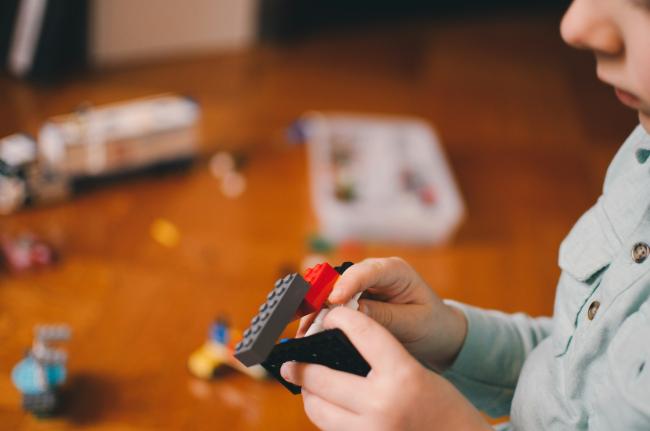Breadcrumbs
Kids Block-Building Selective and Systematic, New Research Finds

New research from the Johns Hopkins Center for Talented Youth offers insights into how kids build with blocks efficiently and accurately. Photo by Kelly Sikkema on Unsplash.
Research could lead to more equitable identification methods and predict academic performance
When Amy Lynne Shelton, PhD, and her co-researchers at Johns Hopkins University gave some children a basket of LEGOs and a model, they expected the children would copy what they saw to construct their own structure. What they didn’t know was how they’d approach the task.
What the researchers saw surprised them. “We found their building was surprisingly systematic,” said Shelton, executive director of the Johns Hopkins Center for Talented Youth. Shelton’s research about block building among a group of 34 children aged 4-8 was recently published in the journal Cognitive Development. “Kids used a very specific subset of the possible build paths. They were very selective in the order in which they built things—they systemically built the first layer, then the second, then the third, just like adults. They made more mistakes along the way than adults did, but they built efficiently and were accurate.”
Here’s what’s significant about these findings, which complement the team’s prior research about adult block building: “We know these kinds of skills are predictors of future math ability and success in STEM-oriented fields,” Shelton said. “If you can pull this apart and understand the way someone builds, you can understand more about their cognition.” For example, more research in this area could help educators better understand differences among students so they can conduct more timely assessments or interventions and create more equitable testing and identification methods. It might even help predict academic performance.
The study was led by Barbara Landau of the Department of Cognitive Science in the JHU Krieger School of Arts and Sciences. In addition to Shelton, collaborators include E. Emory Davis and Cathryn S. Cortesa, formerly of the JHU Krieger School of Arts and Sciences and the JHU School of Education, Zihan Wang, formerly of JHU’s Krieger School, and Jonathan D. Jones of the JHU Whiting School of Engineering.
Watch a video about Amy Lynne Shelton’s block research.
Read a brief summary of this research and learn about ongoing CTY research projects.

